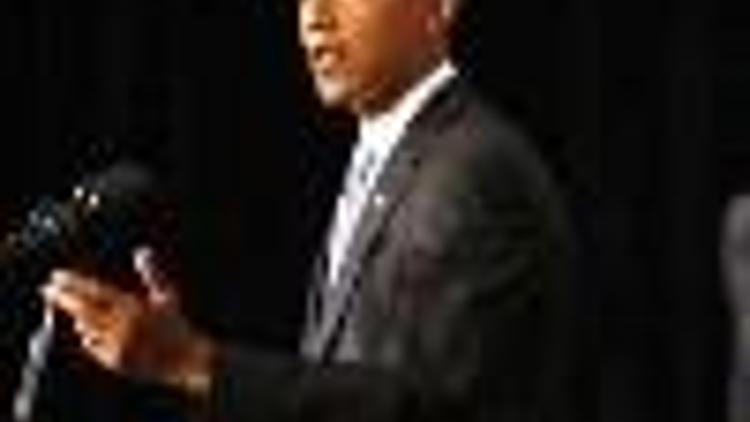Turkey-Obama ties hurt by four obstacles
Güncelleme Tarihi:

ANKARA - Turkey fears issues about Cyprus, Iraq, Afghanistan, and Armenian genocide allegations will cause rifts between the new U.S. administration and the Turkish government. Despite recent progress in many of these areas, Obama and Biden’s links to certain interest groups could endanger an already rocky relationship
Despite the high expectations voiced about the new leaders of the United States, Obama and Biden’s foreign policy could present additional problems to Turkish diplomacy, according to an analysis undertaken by Turkish diplomats.
"There are four major issues where we could face serious disagreement with the new administration; Cyprus, Iraq, Afghanistan and the so-called Armenian genocide claims," a senior Turkish foreign ministry official told the Hürriyet Daily News.
Cyprus problem
It is certain the new administration will continue to back ongoing talks between Turkish and Greek Cypriots to reach a comprehensive settlement. Biden’s strong ties with the Greek lobby in Washington is seen as a matter of concern. Some Turkish experts believe that as the platform for the solution has already shifted from the United Nations to the European Union, Washington’s impact on the process will be limited.
However, Turkish officials point out it was only recently that Turkey’s views on Cyprus have gained legitimacy and weight in Washington, during the Bush era. "Therefore, we have to re-start efforts to arrive at the same level with the newcomers," officials said.
More troops to Afghanistan
NATO countries are expecting pressure from the new administration to send more troops to Afghanistan due to General David Petraeus being promoted to top commander of the U.S. forces in Afghanistan. "The lesson General Petraeus took from Iraq is the success of military surges. The new administration will surely knock on our door to send additional troops," a senior EU diplomat told the Daily News.
Erdoğan questioned Obama’s plan to gradually relocate American troops stationed in Iraq to Afghanistan, saying "Is this going to be a solution or a grave disaster?"
Criticizing the Bush administration’s Iraq policy, which caused massive damage to Iraqi civilization in only six years, Erdoğan recalled the process had begun with the slogan "global peace" in the early 2000s.
"If we defend global peace, we, the world leaders, should work for it in solidarity. The cost (of failure) is the death of millions and the spending of trillions of dollars," he said.
In Iraq, Turkey’s primary concern is a possible wave of instability if there is a quick withdrawal of American troops. The making of a Status of Forces Agreement, or SOFA, between Iraq and the United States is cautiously watched by Turkey.
Baghdad has already announced it will consult its neighbors on the contents of the agreement, expected to include a clause about Iraq’s commitment to the prevention of terrorist attacks on neighboring countries from its territories.
Direct dialogue with northern Iraqi leaders
With regard to establishing direct dialogue with northern Iraqi leaders, the Obama administration will take the same line as the current one.
As for cooperation against the outlawed Kurdistan Workers’ Party, or PKK, diplomats do not foresee a change in U.S. policy. But in the mid-term, the Obama administration could seek a more civilian approach from Turkey to end the terror problem inside the country. In this context, the possible dissolution of the pro-Kurdish Democratic Society Party, or DTP, would attract harsh criticism from Washington.
In relation to the Armenian genocide, Turkish diplomats think the recent rapprochement between Ankara and Yerevan may not be enough to stop the Armenian diaspora’s efforts in the United States to have the 1915 incident officially recognized as genocide.
Both Obama and Biden promised their voters of Armenian origin to work for such a recognition. "There could be attempts for recognition early next year," the official said, adding, "But we have already started to work against this possibility. In our early contact with Obama and Biden’s advisers, we were clear about the sensitivity of the issue."
ÜMİT ENGİNSOY / WASHINGTON While representing Turkey at the Group of 20 economic summit in Washington on Saturday, PM Recep Tayyip Erdoğan is expected to meet with former secretary of state Madeleine Albright, officials said. Obama has opted to stay out of the G20 summit, but Wednesday named Albright, who was democratic ex-president Bill Clinton's top diplomat, and former Republican representative Jim Leach to unofficially meet visiting world leaders on his behalf. "There is one president at a time in the United States, so the president-elect has asked secretary Albright and congressman Leach, an experienced and bipartisan team, to be available to meet with and listen to our friends and allies on his behalf," Obama adviser Denis McDonough said in Chicago, according to a Reuters report. Erdoğan is due to meet with Albright on Saturday afternoon, shortly after the G20 summit's closure, according to his schedule. Obama and vice president-elect Joe Biden will receive a briefing from Albright and Leach after the meetings with world leaders. Erdoğan is expected to voice his suggestion that Turkey mediate between the United States and Iran, which Washington accuses of trying to develop nuclear weapons. He first expressed this proposal in an interview published in the The New York Times on Wednesday. During his election campaign, Obama also pledged to recognize the World War I-era killings of Armenians in the Ottoman Empire as an act of genocide. If he keeps his promise, Turkey and the United States may be heading towards a crisis early on in the Obama presidency, and Erdoğan is expected to voice his concerns over this matter to Albright, analysts said. The G20 summit is to seek a solution to the ongoing global financial crisis and discuss ways to rehabilitate the financial system. But in the absence of Obama, who will direct the U.S. economy over the next four years, it is not clear if such efforts will amount to anything more than a show of solidarity. |

